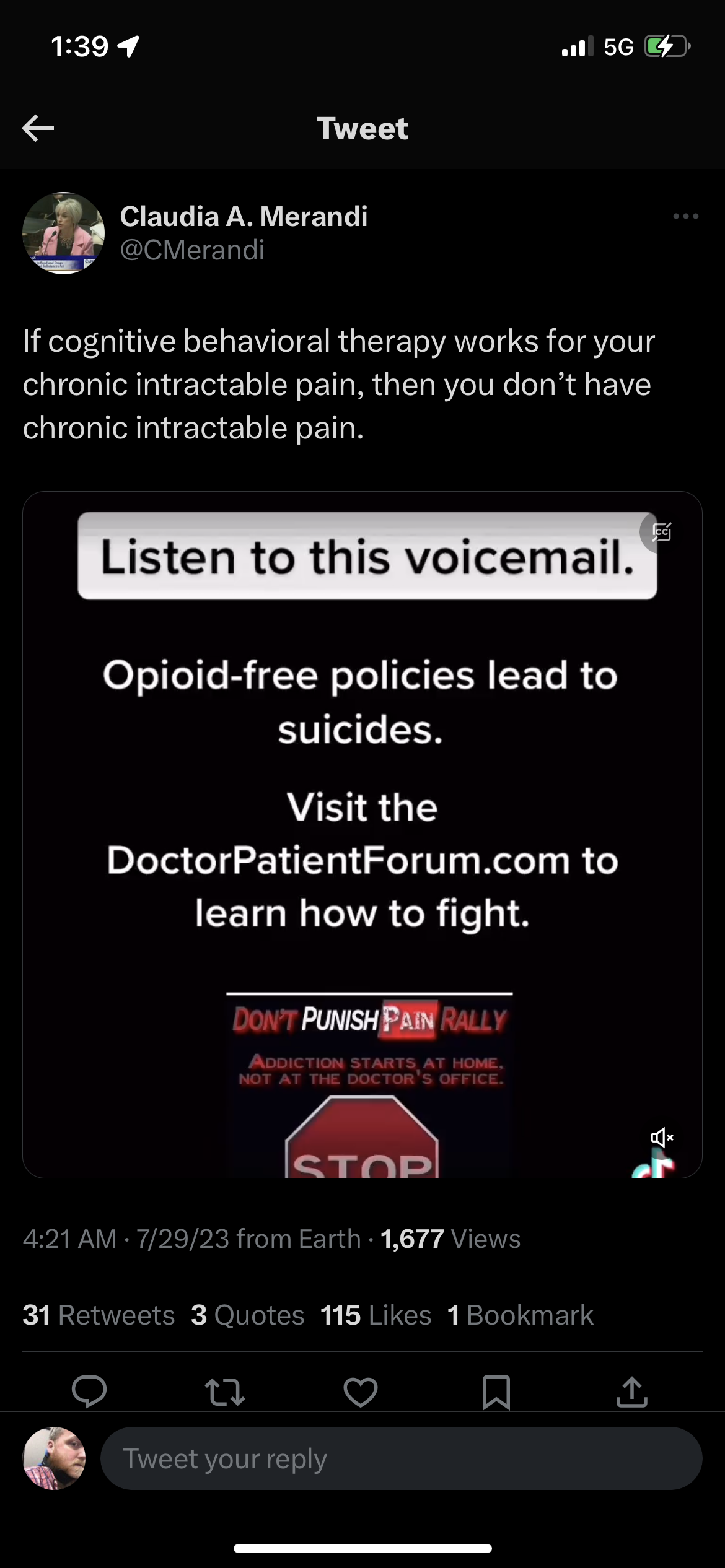Advocacy vs Anger: Where is that line?
“Fear is the path to the Dark Side. Fear leads to anger. Anger leads to hate. Hate leads to suffering.” Yoda
I’m not sure, and I don’t want to assume, but I think there is a legitimate chance that Yoda was a chronic pain patient just to like me.
Where is the line between advocacy versus anger? The simple and honest answer, I have no idea. Not a damn clue, I’m not sure anyone does regardless of what their ego’s might argue. What do I do know? It is time to talk about anger in the chronic pain community.
If you are only here in the hopes of finding a new OnlyFans account, I’m sorry to disappoint. What I can offer is the following, there is a tremendous amount of anger in the chronic pain community. Much of this anger can be traced back to the CDC’s (Center for Disease Control) 2016 ridiculous Opioid Guidelines. These “guidelines” caused many, if not most of us chronic pain patients’ unnecessary pain and future harm (I’m still angry at the CDC for this, even after their recent attempt to correct their wrong). There is anger at so called “advocacy” groups like PROP who believe opioids should never be prescribed for chronic pain or even pain control after surgery, yet often do not have any proposed treatments for my chronic pain management outside of opiates. And of course, I must mention greed; no longer is making tens or even hundreds of millions are enough (that seems to be considered middle class by some), some people are not content until they have billions and billions in their pockets regardless of who they hurt along the way. All legitimate reasons to be angry.
Another term for anger, especially in healthcare, is advocacy job security. These three chronic pain related items alone require hundreds of highly engaged and active patient advocates or leaders in order to solve. We also need doctors, nurses, pharmacists, and pharmaceutical companies to stand with us too. In order to begin the process of designing solutions to these problems, we need as many chronic pain patients as possible that are willing to share their individual patient stories on a national level, that’s a level of vulnerability which is going to be hard to find even under the best of circumstances. We need leaders that understand and respect the power of questions like, “How might we…”. It is time for hero’s, we need inspiration from patients like me. This is the ONLY way we can prevent anger from becoming hate like Yoda talks about.
What does hate look like? First, for the benefit of patients I think we need to modify the question. The question should be, “what does unproductive or dangerous hate look like?”. There is a difference between a chronic pain patient expressing hate at the CDC because they just received less than stellar care from a pain specialist vs a pain patient expressing hatred towards other chronic patients for example.
There is a reason I mentioned pain patients expressing hatred towards other patients. Yesterday, I came across a chronic pain patient on Twitter who was blaming people with addiction for their suffering. More specifically, this patient called addicts “dolts” whose “DNA is subpar”. This isn’t advocacy or helpful to anyone, her attitude and words are a cancer to the chronic pain community. Yes, that might be harsh for one chronic pain patient to say to another. If we want meaningful change, either at the ballot box or in public health, we (advocates) need to start policing ourselves. The fact is this is nothing but hatred which only leads to the dark side, not better policy or even compassion for any patient in the healthcare community.
There is another form of hatred in the chronic pain community that is being masked as “advocacy”. It is based on the idea that opioids are the “gold standard” or the only viable pain treatment option for patients like me. Some are even going so far to state that if your pain is helped by any other treatment modality, it is not chronic intractable pain. They are flat out stating that if you find relief with ice packs, stretching, meditation, cognitive behavioral therapy, floating, exercise, Tylenol or Advil, or NSAIDs that you are not a true chronic pain patient. This type of arrogancy and recklessness should be criminal.
Dad, a retired one-star general, was fond of the phrase “it’s time to come to Jesus”. For chronic pain patients there must be a realization that even if we cured addiction tomorrow and turned ever single drug cartel into a Disneyland Park, we still wouldn’t have unfettered or unrestricted access to opioids. Not only that, I also don’t believe we should have unfettered access to opioids. Regardless of your opinion, doctors are experts too and deserve our respect just like they should respect us.
In addition, advocates that state if a recognized and viable treatment option works for you that you are not a true or real pain patient should probably be in jail. At the very least, they should lose their internet privilege. Complete strangers, especially complete strangers that know NOTHING about your patient story, don’t have the right to determine if you are a true patient or not. I don’t care if they are celebrities with lots of likes or followers, they are trash that should NOT, I repeat should NOT, be listened too or followed. Advocates and leaders work for the betterment of all, people like this work for the glorification (read ego) of their message.
Also, let’s not forget everyday there is a new crop of new and future patients that are looking for information about chronic pain but are not ready to speak on a social media platform yet. I know this because that’s how I got started on social media. At one time I was a typical male that accepted that showing any kind of vulnerability, especially from pain, meant that I was not a real man. What I didn’t need at that time was people, especially ones with fancy sounding titles like “patient advocate or patient leader”, claiming I was not a real patient if I received relief from a particular treatment. We need to be creating spaces for these new people, not judging them for simply trying for a better quality of life.
Let’s talk about greed for a minute. The trouble with capitalism is it promotes and accepts greed as a good thing. The business community might argue that there is a difference between obtaining profits vs obtaining greed. They will tell us that seeking profits is righteous, it’s how companies can continue to innovate which is how we (chronic pain patients) will obtain a cure. What they won’t tell you is that profits in the tens of millions are not acceptable when your competitor is making profits in the billions. In order to reach such levels, companies must develop aggressive sales models, think Perdue Pharmaceuticals, in order to reach the billion-dollar club. I mention Perdue because I’m not convinced what they did in the 1980’s and 90’s was illegal under our current economic system, ethically they were walking a brown line.
Regardless of my personal beliefs regarding Perdue, their policies put a bad taste in the publics mouth regarding opioids. This bad taste is still there today. We (the chronic pain community) need to start voting for candidates that realize that capitalism doesn’t give a damn about individual patients in pain. It doesn’t care if we get hurt or receive relief from their products. If a company makes a profit, capitalism has done its job. What we can’t do is continue to vote for candidates that conflate political entertainment (will the orange one say something racist or misogynistic again for example) with honest political engagement. Leaders who focus on human centered solutions, not tv ratings, are needed in order to support those chronic pain patients who are willing to share their stories on a national level.
Hate leads to suffering. We in the chronic pain community are suffering, I’m not in any way questioning anyone’s suffering or their hatred. It’s not easy living a life in pain, nor am I convinced it should it be. A little bit of a side note but much of my success can directly be attributed to the fact I constantly (minute by minute) work towards keeping my quality of life high, I don’t rely on opioids for that. I’m also not bragging about my chronic pain when I mention that I’ve had providers try to reduce my opioid amounts due to the 2016 CDC guidelines, I’ve had multiple radio frequency ablations, I’ve gone into withdrawal due to a business decision of a company, had countless steroid and epidural injections, experienced 11 surgeries and counting, had countless x-rays and MRI’s, have tried other meds like Gabapentin, and have been asked to try just about every over-the-counter pain and arthritis medication on the market. I’m giving you my chronic pain resume to prove a point, I’ve had just as many bad days, months, as anyone yet I don’t consider myself as having a bad quality of life. In fact, I strongly believe I have a human right to a great quality of life despite my pain. The only way I’m going to continue to fight for a high quality of life is if I have access to multiple treatment options, which I can deploy with my healthcare team at a moment’s notice, without stigma or judgement from others.
Fear is the path to the Dark Side. Fear leads to anger. Anger leads to hate. Hate can lead to suffering, but it can also lead to some innovative human centered solutions if used correctly.” Alan Brewington



